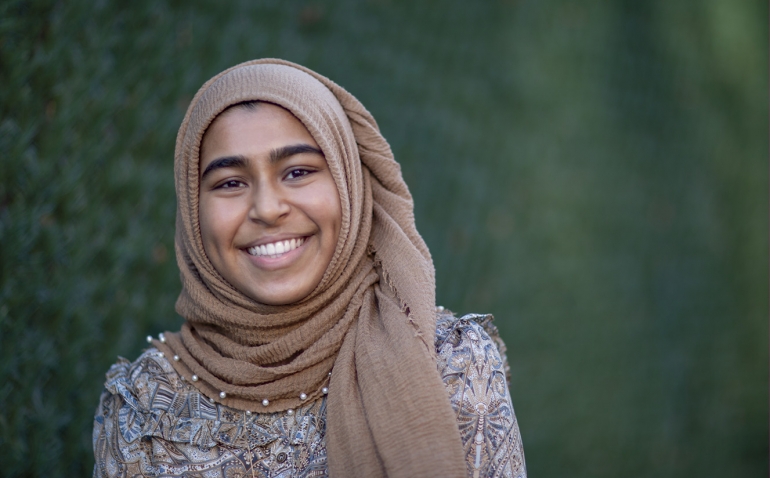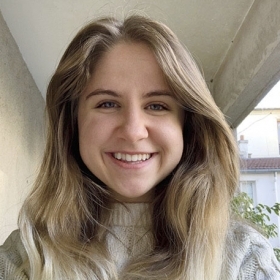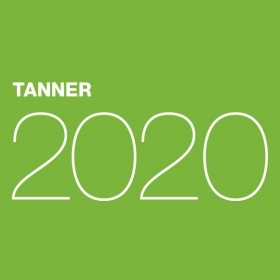Photo by Amos Chan
Nowshin Arif ’23 hasn’t been on campus since spring 2020, but she has stayed deeply connected with the Wellesley community. From her family’s home in Queens, N.Y., she’s been taking classes—in term one, Middle Eastern studies and an “amazing” intro sociology class about thinking globally, and in term two, a history class about the Indian Ocean trade and a 200-level Arabic class—and dropping into her favorite orgs, the Multifaith Council and Al-Muslimat, the Muslim student group on campus.
She’s helping keep things running in Queens, too. “I have an older brother who started his first year of med school remote from home,” she says. “My mom works at a hospital, so we just try to hold down the house when she’s out.”
Add to that her role as an academic success coach (ASC), offering other students a virtual helping hand, and it’s no wonder one of her major concerns is time management.
ASCs work both in person and remotely to provide peer-to-peer academic support to other students. Trained by the College’s Pforzheimer Learning and Teaching Center (PLTC), they focus on basic study skills like note-taking, test-taking, getting organized, and communicating with faculty.
“One tip I offer is to plan each day, but also plan your week ahead of time,” says Arif. “That can really help, especially now when a week is a pretty big chunk of the term. But if you find that you can’t always get your tasks done, don’t be too hard on yourself. A really important thing is to step away from the computer. I say it all the time—and I know it’s really hard, even for me.”
Managing the intensity of two seven-week terms has been a concern for the students she works with, Arif says. “In the structure of our learning this year, I find that I’m constantly reading content but don’t have enough time to digest it. To a degree, that is true for most people—and that’s also amplified for those on campus because they have all these restrictions about what they can’t do when they don’t want to be studying.”
Finding ways to help within a brand-new learning structure has been challenging, Arif says. “When it came to the end of term one, a few students of mine were quite stressed out because they had been essentially isolating for a very long time, and then [as first-years] had to face these sets of finals that they hadn’t faced before.”
Arif says she has enjoyed being there for first-years. “They were coming from very different places, very different schools, and they were super-excited, but they didn’t quite understand how things would work—and neither did I,” she says. “Every student is a different learner, and every student has a different situation beyond being at Wellesley. It was nice to have conversations with people so that we could get to know each other, understand our circumstances, and then figure out how to be successful students at the same time.”
Arif, who came to Wellesley from an 1,100- student magnet high school for the humanities in New York, says an ASC helped her make the transition to college. “She was just this super-bubbly personality. When I’d come to campus, I was super shy and super reserved, because I wasn’t sure how I should be. I felt out of my comfort zone. Her being the opposite made me come out of my shell just a little bit,” Arif says.
When the PLTC sent out applications for ASCs last spring, Arif decided to apply. “I wanted to be of help to first-years the way I had received really great support during my first year,” she says.








We ask that those who engage in Wellesley magazine's online community act with honesty, integrity, and respect. (Remember the honor code, alums?) We reserve the right to remove comments by impersonators or comments that are not civil and relevant to the subject at hand. By posting here, you are permitting Wellesley magazine to edit and republish your comment in all media. Please remember that all posts are public.